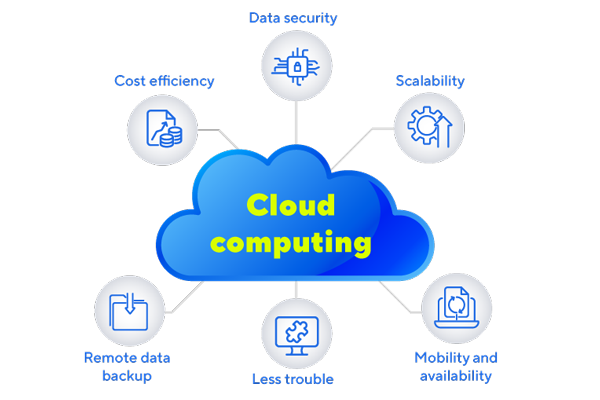What is Cloud Computing in Business? |

Cloud computing has allowed businesses to scale, create a flexible work environment, and increase productivity. It provides greater flexibility for businesses wanting to operate from anywhere, as well as allowing businesses to reduce costs.
In a business setting, cloud computing refers to the use of remote servers hosted on the internet to store, manage, and process data. This includes digital workspaces like Google Workspace and Microsoft Teams, as well as software which is accessed online, like Slack or HubSpot.
Summary: cloud computing in business
Cloud computing in business refers to the use of remote servers hosted on the internet to store, manage, and process data, rather than using local servers or personal devices.
Cloud computing reduces the need for physical hardware and maintenance, which in turn reduces operational costs.
Businesses can easily scale up or down based on demand, allowing for flexibility and growth.
Cloud services allow employees to access data and applications from anywhere, making remote work and collaboration easier.
Leading cloud providers offer advanced security features, such as encryption and regular backups, making business data more secure.
Cloud computing for business gives organisations access to tools and services that enable businesses to adopt new technologies (like AI and big data) more rapidly.
Understanding cloud computing’s role in business
Cloud computing means the delivery of computing services – such as storage, processing power, and applications – over the internet. For businesses, it has become an essential tool due to its flexibility, scalability, and cost-effectiveness.
Companies use cloud computing to reduce the need for expensive, on-site hardware and IT management, allowing them to focus on core operations while accessing cutting-edge technologies.
The main reasons businesses implement cloud computing include:
Reducing operational costs
Scaling resources as needed
Enhancing collaboration across teams through remote access
One major benefit of cloud computing for business is it enables innovation, giving businesses the ability to use advanced technologies like AI, big data, and machine learning without the huge computer processing power they would need without it.
Cloud computing requires a stable and strong internet connection to function effectively, which makes selecting the right provider critical. Find out more about what businesses need from their broadband. For businesses looking for reliable connectivity, Hyperoptic offers ultra-fast broadband tailored for high-demand business environments.
What is cloud computing in general?
Cloud computing is the delivery of various services, such as storage, databases, and software, over the internet. This allows users to access and use these resources, apps and programmes remotely, rather than relying on local servers or personal devices.
Cloud computing technology makes it easier for individuals and businesses to scale their operations, collaborate, and store data without the need for heavy upfront investments in infrastructure. It’s one of the reasons most of us are able to do so much from just a phone, tablet or computer.
If you’d like to learn more about how cloud computing works, visit Hyperoptic’s cloud computing page.
Different types of cloud computing
Although it was only introduced in around 2006, most businesses now rely on cloud computing to function. Everything from website hosting to email access to document and file storage is now done using cloud computing.
Cloud computing comes in various forms, and is tailored to meet different business needs.
The main types of cloud computing include public, private, and hybrid clouds, alongside service models like Infrastructure as a Service (IaaS), Platform as a Service (PaaS), and Software as a Service (SaaS).
Each type offers its own benefits depending on how businesses want to manage their resources, data, and applications.
| Type | Description |
|---|---|
| Public Cloud | A cloud service provided by third-party vendors to offer shared resources over the internet to multiple users. Examples: Amazon Web Services (AWS) and Microsoft Azure. |
| Private Cloud | A cloud environment dedicated to a single organisation. This gives businesses control over the service and more security and privacy. Examples: IBM Cloud Private and OpenStack. |
| Hybrid Cloud | Combines public and private clouds, allowing data and applications to be shared between them. Examples: Amazon Web Services (AWS) Outposts and Dell Technologies Cloud. |
| IaaS (Infrastructure as a Service) | Provides virtual computing resources like servers and storage over the internet. Examples: Google Cloud Platform (GCP) and DigitalOcean. |
| SaaS (Software as a Service) | Delivers software applications over the internet, accessible on-demand through a subscription model. Examples: Salesforce and Dropbox. (In the consumer world, services like Netflix and Spotify are SaaS). |
| PaaS (Platform as a Service) | Provides a platform allowing developers to build, deploy, and manage applications without handling the underlying infrastructure. Examples: Heroku and Microsoft Azure App Service. |
What is cloud computing used for in business?
Cloud computing allows businesses to access computing resources like data storage, software, and processing power over the internet.
This means there’s no longer a need for on-premise servers and hardware. The benefits of this are better collaboration, reduced costs, more flexibility, and the ability to scale around the world. Cloud computing in business allows employees to work remotely, access data in real-time, and scale resources up or down depending on demand.
Before cloud computing, businesses relied heavily on local servers and on-site data centres where they would store and manage information. This required significant investment in hardware like servers. It also involved a lot of ongoing maintenance, used a lot of physical space and lacked the flexibility that cloud computing now provides.
What are the benefits of cloud computing for business?
Cloud computing offers plenty of advantages for businesses. It enables them to streamline operations, enhance collaboration, and reduce costs. So what are the benefits of cloud computing for businesses?

Scalability
Whether your business experiences seasonal demand spikes or needs to grow rapidly, cloud services allow you to scale up or down quickly and effortlessly. This avoids the long lead times and costs associated with purchasing and installing additional physical hardware.
Improved security infrastructure
Cloud providers typically offer advanced security features like encryption, firewalls, and regular backups, which can be more robust than in-house IT infrastructure. These measures mean business data is protected against cyber threats and accidental loss. More information on cloud security.
Assists collaboration across the business
Cloud platforms enable real-time collaboration, as well as allowing employees to access data and tools from any location. This is especially useful as remote work becomes more common, helping businesses maintain productivity regardless of where their employees are located.
Affordability and reliability
Cloud computing removes the need for substantial upfront investments in hardware and infrastructure. Businesses only pay for the resources they use, making it a flexible and cost-effective solution that reduces IT expenditure.
Cloud computing also offers more reliability with features like built-in redundancies, making it easier for businesses to recover quickly from disruptions. When something like a natural disaster or hardware failure occurs, data can be restored from a different geographic location, ensuring minimal downtime.
Improved filing structure and accessibility
Traditional filing systems were often reliant on physical servers and manual data entry, which meant they often became disorganised and difficult to manage. Cloud-based systems, on the other hand, centralise data storage, allowing for structured, logical organisation and easy retrieval. Businesses can categorise and tag their data with custom metadata, making it simple to search and access files whenever needed.
Plus, employees can access the information from anywhere in the world.
Most popular FAQs
What advantages does cloud computing offer corporate customers?
Cloud computing offers corporate customers several key advantages, including:
- Cost savings: Businesses can eliminate the need for expensive on-site hardware and IT maintenance, paying only for the resources they use.
- Scalability: Corporations can easily scale their operations to match fluctuating demands, adding resources during peak times and reducing them when not needed.
- Enhanced collaboration: Employees can work from anywhere with internet access, improving remote collaboration and productivity across teams.
- Data security: Cloud providers offer robust security features, including encryption, firewalls, and regular backups, which often surpass what most companies can manage on their own. Find out more about keeping your business secure.
- Disaster avoidance: Cloud computing ensures businesses can recover quickly from disruptions, as data is stored redundantly across multiple locations.
What is business on demand cloud computing?
Business on demand cloud computing is where businesses can access cloud-based computing resources like storage, software, and processing power, on an as-needed basis. This allows businesses to scale their resources up or down in real-time based on demand, eliminating the need for significant upfront investments in IT infrastructure.
How does cloud computing work for businesses?
Cloud computing allows businesses to access a wide range of computing resources over the internet – including data storage, servers and software. Businesses work with cloud service providers who manage the infrastructure and provide scalable, on-demand resources. These resources are hosted in remote data centres and can be accessed from anywhere via the internet.
What are the benefits of business central cloud?
Business central cloud provides businesses with the benefits of scalability, flexibility, and cost-efficiency by integrating ERP (Enterprise Resource Planning) and CRM (Customer Relationship Management) functionalities in a cloud environment.
It gives businesses real-time data access, automatic updates and secure collaboration from anywhere, improving productivity and reducing the need for on-site infrastructure and IT maintenance.
How does cloud computing work for businesses?
Cloud computing allows businesses to access resources like storage, software and processing power over the internet. This eliminates the need for on-premise hardware, enabling scalability and saving businesses money. You pay only for what you use, and data is securely managed by cloud providers.



